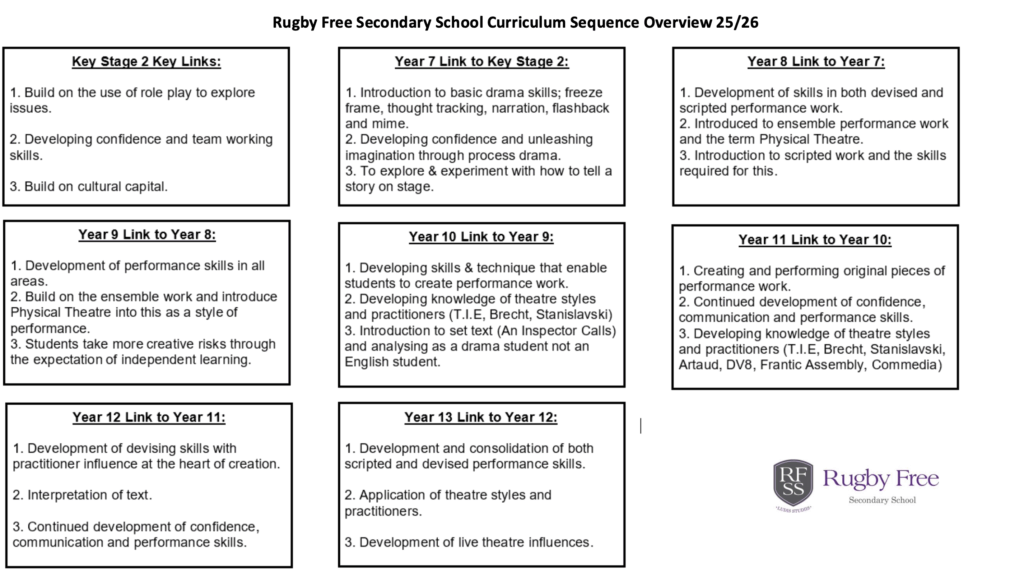Increasingly the power of drama is being recognised as one of the most effective ways to develop skills and emotional intelligence in young people. Drama promotes communication skills, teamwork, dialogue, negotiation, socialisation and problem solving.
The essence of Drama lies in its capacity to provide students with the opportunity to ‘pretend to be someone else’. It is through such acts of imagination that students are able to explore the way they might behave and react in different circumstances and within different social and cultural parameters.
Drama Department – Overarching Curriculum Intent (September 2025)
RFSS Curriculum Vision Statement:
To build an inclusive curriculum which is aspirational for all and empowers our students to make outstanding academic and personal progress.
Drama Curriculum in Context:
Within KS3 we intend to equip students with the skills, knowledge and understanding of dramatic techniques that they will need to interpret themes and issues that surround them within society. In the classroom we model and have high expectations across the board in standards of learning and behaviour. This has been developed through an ethos of respect and creative freedom in the classroom. We intend to stretch and challenge all our students through the development of independent learners and allowing students the freedom of interpretation and the culture that it is OK to get something wrong!
Drama is assessable to all groups of students i.e. PP, SEN, EAL, through students working in mixed ability groups and students supporting one another in their learning.
Within KS4 and KS5, we intend students to apply their skills, knowledge and understanding of dramatic skills and techniques whilst demonstrating critical judgement in their application. Students can do this with support from teaching staff. Across the school, we aim to give all students the opportunity to experience the Arts in a wider context, for example, to perform in the whole school musical productions, enrichment, visits from professional theatre companies and theatre trips.
Curriculum Aims:
Our curriculum aims to:
- Develop confident young people who can communicate effectively with one another.
- Inspire our students to explore and develop their own ideas creatively.
- Give students the skills needed to be able to sympathise and empathise with situations around them.
- Explore and develop their own social, spiritual, moral and cultural understanding.
Our broad and balanced curriculum concentrates on developing our students’ key knowledge and skills, and enhances their understanding of the world around them.
We do this by:
- Delivering engaging topics that are relative to the world around them, in a safe and trusted environment.
- Giving students the opportunity to articulate and express their ideas, views and opinions about a wide range of topics and issues clearly, confidently and respectfully.
- Enabling creativity by supporting students to develop their own ideas and that of others.
Our curriculum is focused on the development of communication, character and cultural capital of each individual student, so they become:
- Empathetic citizens who can understand and engage with others outside their own social, cultural and historical setting.
- Creative and imaginative thinkers who are not afraid to get things wrong.
- Team players who can communicate effectively in group situations and understand the importance of listening to others to move forward.
- Articulate individuals who can verbalise their own thoughts, ideas and emotions.
Curriculum Outcome:
As a result of our curriculum, students will leave RFSS with improved confidence, who have developed the skills required to work as part of a team by communicating effectively with those around them. Students will have taken part in cultural experiences both inside and outside of the classroom that will enhance their understanding of drama, themselves and others.

